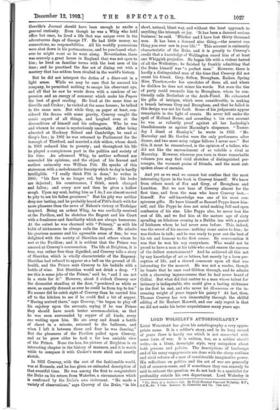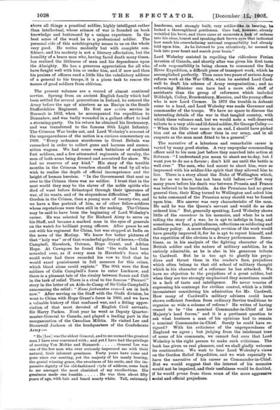LORD WOLSELEY'S AUTOBIOGRAPHY.*
LORD WOLSBLEY has given his autobiography a very appro- priate name. It is a soldier's story, and in its long record of years there is hardly one which is not connected with some form of war. It is written, too, as a soldier should write,—in a blunt, downright style, very outspoken about both persons and policies. The descriptions of landscape and of his many engagements are done with the sharp outlines and vivid colours of a. man of considerable imaginative power. His reflections on politics and the art of war are generally full of common-sense, and if sometimes they can scarcely be said to exhaust the question, we do not look to a specialist for profundity outside his own department. Lord Wolseley is • The Story of a Soldier's Life. By Field-Marshal Viscount Wolseley, dtc. 2 vols. London A. Constable and Co. [32s. net.]
above all things a practical soldier, highly intelligent rather than intellectual, whose science of war is founded on book knowledge and buttressed by a unique experience. In the best sense of the word he is a professional soldier. The personal side of this autobiography seems to us on the whole very good. He writes modestly but with complete con- fidence, and his modesty is not a literary affectation, but the humility of a brave man who, having faced death many times, has realised the littleness of man and his dependence upon the Almighty. He has a generous appreciation for all who have fought well with him or under him, and if now and then his praises of officers read a little like the valedictory address of a general to his troops, it is a pious task to rescue the names of good soldiers from oblivion.
The present volumes are a record of almost continual service. Sprung from an ancient English family which had been settled for several generations in Ireland, he entered the Army before the age of nineteen as an Ensign in the South Staffordshire Regiment. He first saw active service in Burmah in 1853, when he accompanied the expedition to Donnabew, and was badly wounded in a gallant effort to lead a storming-party. On his return he obtained his lieutenancy, and was transferred to the famous 90th Light Infantry. The Crimean War broke out, and Lord Wolseley's account of the unpreparedness of the nation is a curious commentary on 1899. "Every ordnance storehouse in Great Britain was ransacked in order to collect guns and harness and ammu- nition wagons. We had some weak battalions of excellent foot soldiers, and a few attenuated regiments of cavalry, the men of both arms being dressed and accoutred for show. We had no reserves of any kind." His story of the terrible months in the Crimean trenches should be read by all who wish to realise the depth of official incompetence and the height of human heroism. "In the Government that sent us over to the Crimea there was no soldier. I trust that in the next world they may be the slaves of the noble spirits who died of want before Sebastopol through their ignorance of war, of its wants, and of its stupendous difficulties." He met Gordon in the Crimea, then a young man of twenty-two, and we have a fine portrait of him, as of other fellow-soldiers whose reputations were then still in the making. The Crimea may be said to have been the beginning of Lord Wolseley's career. He was selected by Sir Richard Airey to serve on his Staff, and became a marked man in the eyes of generals on the watch for brilliant young officers. After peace he set out with his regiment for China, but was stopped at India on the news of the Mutiny. We know few better pictures of that "holy war" or of that wonderful gallery of heroes,—Colin Campbell, Havelock, Outram, Hope Grant, and Adrian Hope. At Cawnpore he found that "the walls had been scrawled over, as if every man in Havelock's force who could write had there recorded his vow to God that he would exact punishment in full measure for this crime, which blood alone could expiate." The 90th were the first soldiers of Colin Campbell's force to enter Lucknow, and there is a pleasant tale of the rivalry between Saxon and Celt in the task of relief. There is a rival to the famous "Peccavi" story in the letter of an Aide-de-Camp of Sir Colin Campbell's announcing the relief: "Num fortunatus sum—I am in luck now." After serving on the Staff with the Oudh division, he went to China with Hope Grant's force in 1860, and we have a valuable history of that confused war, and a fitting appre- ciation of that most devoted of English Civil servants, Sir Harry Parkes. Next year he went as Deputy Quarter- master-General to Canada, and played a leading part in the reorganisation of the Canadian Militia. He visited Lee and Stonewall Jackson at the headquarters of the Confederate Army :—
" He [Lee] was the ablest General, and to me seemed the greatest man I have ever conversed with; and yet I have had the privilege of meeting Von Moltke and Bismarck General Lee was one of the few men who ever seriously impressed me with their natural, their inherent greatness. Forty years have come and gone since our meeting, yet the majesty of his manly bearing, the genial winning grace, the sweetness of his smile, and the im- pressive dignity of his old-fashioned ctyle of address, come back to me amongst the most cherished of my recollections. His
greatness made one humble He was then about fifty years of age, with hair and beard nearly white. Tall, extremely
handsome, and strongly built, very soldier-like in bearing, he looked a thoroughbred gentleman. Care had, however, already wrinkled his brow, and there came at moments a look of sadness into his clear, honest and 'speaking dark brown eyes that indicated how much his overwhelming national responsibility had already told upon him. As he listened to you attentively, he seemed to look into your heart and search your brain."
Lord Wolseley assisted in repelling the ridiculous Fenian invasion of Canada., and shortly after was given his first taste of sole responsibility in being chosen to command the Red River Expedition, a difficult piece of transport work, which he accomplished perfectly. Then came two years of serious Army reform work at the War Office, when he assisted Lord Card- well to draft his scheme of Army reorganisation; and no reforming Minister can have had a more able staff of assistants than the group of reformers which included Biddulph, Colley, Brackenbury, Maurice, and the young officer who is now Lord Cromer. In 1873 the trouble in Ashanti came to a head, and Lord Wolseley was made Governor and commander of the troops. We have no space to discuss the interesting details of the war in that tangled country, with which these volumes end, but we would note a well-deserved tribute to a very able and ill-fated soldier, Sir George Colley :— "When this little war came to an end, I should have picked him out as the ablest officer then in our army, and in all respects as the man most fitted to be a general."
The narrative of a laborious and remarkable career is varied by many good stories. A very unpopular commanding officer said to his men just before they marched into action at Sobraon : "I understand you mean to shoot me to-day, but I want you to do me a favour; don't kill me until the battle is well over." The men, who had meant to shoot him, were so impressed with his soldier-like spirit that they allowed him to live. There is a story about the Duke of Wellington which, so far as we know, has not been told before :--" Not very many years before his death war between Prussia and France was believed to be inevitable. As the Prussians had no great general then, their King turned to Wellington and asked him to take command of the Prussian army should war be forced upon him. His answer was very characteristic of the man. He said he was the Queen's servant and would do as she ordered him." But, generally speaking, Lord Wolseley shows little of the raconteur in his memoirs, and when he is not telling the story of a war, he is apt to indulge in long, and sometimes, we fear, platitudinous, reflections on soldiering and military policy. A more thorough revision of the work would have greatly improved it, for he is apt to repeat himself, and the repetition of the obvious is a dreary performance. Some- times, as in his analysis of the fighting character of the British soldier and the nature of military ambition, he is entirely admirable, as he is also in his generous tribute to Cardwell. But he is too apt to glorify his preju- dices and thrust them in the reader's face, prejudices which often belong to that old school of military thought which in his character of a reformer he has attacked. We have no objection to the prejudices of a great soldier, but when they are too strongly emphasised they sometimes result in a lack of taste and intelligence. He never wearies of expressing his contempt for civilian control, which is a little inconsistent considering his admiration for Mr. Cardwell. How many of Cardwell's military advisers could have shown sufficient freedom from ordinary Service traditions to organise so wide a scheme of reform ? He writes of having ceased to be "the nominal Commander-in-Chief of his Majesty's land forces," and it is a pertinent question to ask what business a man of his opinions had to remain a nominal Commander-in-Chief. Surely he could have re- signed? With his criticisms of the unpreparedness of England we agree ; but judging from the intolerant tone of some of his comments, we cannot feel sure that Lord Wolseley is the right person to make such criticisms. The book has given us real pleasure, and we shall gladly welcome its continuation. We wish to hear Lord Wolreley's views on the Gordon Relief Expedition, and we wish especially to have the narrative of his career as Commander-in-Chief. But we would suggest that the interest of his memoirs would not be impaired, and their usefulness would be doubled, if he would prune from them some of the more aggressive social and official prejudices.



























































 Previous page
Previous page